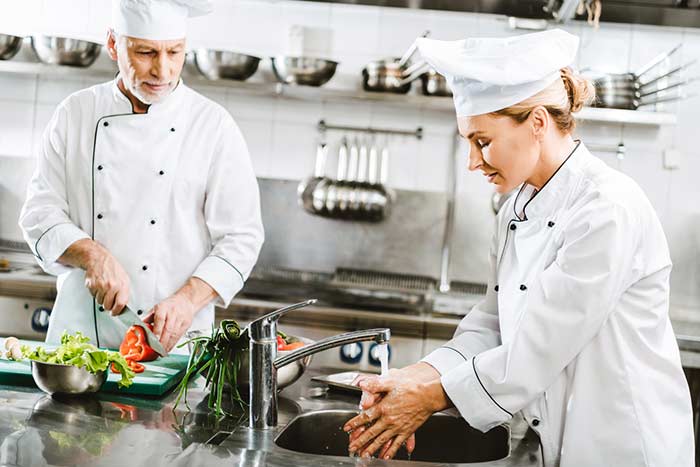Food poisoning is an illness caused by eating or drinking food or water contaminated with bacteria, viruses, parasites or chemicals. Some of these toxins are found naturally in foods, while some have accumulated in the environment. Food poisoning is not only extremely unpleasant for the person suffering from it, it can also be detrimental to the reputation of the kitchen where the outbreak occurred. At Cleaning Edge, we specialise in cleaning of commercial kitchens and we understand the importance of a clean and hygienic space to the success of every hospitality business. Here’s our guide to reducing the risk of food poisoning.
Types of Food Poisoning
There are many different bacteria and viruses that all have different effects, some of the most common types are:
- Salmonella – gastro and flu-like symptoms that appear between 8 and 72 hours (usually 12-36 hours) after eating the infected food and last for 2 to 5 days.
- Listeria – gastro or flu-like symptoms that usually appear within 3 weeks, but can take up to 70 days.
- Norovirus or rotavirus – severe gastro or flu-like symptoms that usually begin 24 to 48 hours after exposure and last 1 or 2 days (norovirus) or up to 6 days (rotavirus).
- coli – gastro symptoms that usually appear within 3 to 4 days and last about 1 week.
Food Handling Tips to Reduce the Risk of Food Poisoning
There are a few simple rules you can follow to help minimise the risk of food poisoning. These steps will help to prevent food from being contaminated and prevent the bacteria in the food from growing and multiplying.
- Avoid handling food when you are unwell
- Wash your hands thoroughly in soap and water before you touch any food. Make sure you also do this after you have visited the toilet and before you handle food. Also thoroughly dry your hands.
- Uncooked meats should be kept covered and separated from cooked foods and ready-to-eat foods to avoid cross contamination
- Put food in the refrigerator in closed containers or covered with plastic wrap to reduce the risk of cross contamination
- Use clean utensils, plates or containers to prevent contaminating cooked food or food that will be eaten raw
- Always use clean equipment to pick up food
- Always wear clean clothes or a clean apron when handling or preparing food
- Wash all fruit and vegetables under running water
- Do not wash raw chicken, meat or fish before cooking as this does not remove any harmful bacteria and may splash water around the kitchen that can transmit bacteria
- Ensure meat, seafood, poultry and eggs are cooked thoroughly
- Keep hot food at 60ºC or above until served
- Store cold food at 5ºC or below
- Ensure cold groceries go into the refrigerator as quickly as possible
- Thaw frozen food in the refrigerator or microwave
- Do not refreeze food once defrosted
- Check the temperature of the refrigerator regularly
Keeping The Kitchen Clean
Kitchens should be kept clean and free from bacteria whenever possible. This will reduce the risk of bacteria spreading and causing infection. Proper kitchen cleaning includes:
- Thoroughly wiping down and sanitising of all kitchen worktops
- Washing chopping boards either by hand with hot soapy water or by a dishwasher after every use
- Washing of all utensils in hot water and soap or in the dishwasher after every use
- Washing of tea towels, dishcloths and general purpose cloths on a regular basis. Dirty or stained tea towels are an ideal breeding ground for bacteria so it is important to wash them frequently.
- Frequent mopping and sanitising of floors, sinks, ovens, fridges and other appliances
- Frequent removal of rubbish and wiping up of any spills
Keeping a commercial kitchen clean and hygienic is one of the most important ways to prevent contamination of food and an outbreak of food poisoning. If you are looking for the best commercial cleaning company that is experienced in maintaining kitchen cleanliness to the highest standards, contact the team at Cleaning Edge today.





